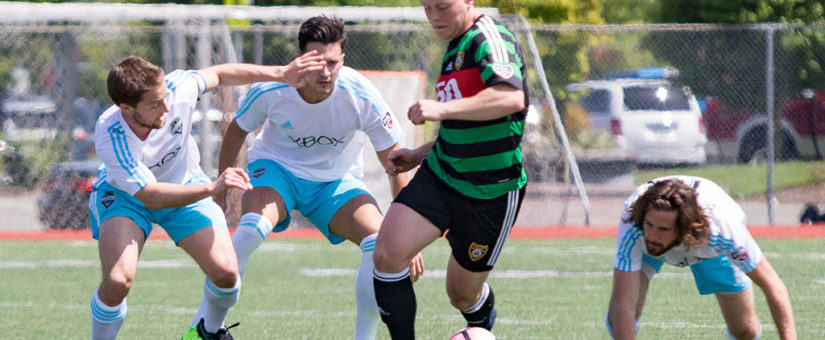
Mental Skills of the Pro Soccer Player: Group Case Study
In a previous post I talked about how much of their game the pro soccer player believes to be mental. As you recall, the collective belief from this group of players is that 69% of the game is mental for them. In the same group case study, I measured the actual mental skills of a group of young pro players. As a reminder, this group case study on mental skills in the emerging pro player consists of 30 players in their first 5 years of league play: 11 MLS, 19 combined from USL, NASL—including full and youth national team players, former NCAA All-Americans, foreign players, players from big schools, mid major schools, NCAA D3 institutions, and Junior colleges. Participants are a mixture of starters and bench players spread across all positions and all regions of the country. Some players in this group study have played on teams that have won an MLS cup in the last two years, some have never seen the play-offs at the pro level. Finally, the average age of the players in this study is 23 years old across all levels of play. Today we are going to answer the question;
Is there a definable mental skills profile of the emerging pro player?
In short, yes! Let’s take a look at the factors going into defining the mental skills profile of the young, pro soccer player. Mastering the many different challenges affecting the professional soccer player in this country is vital for consistent, effective play. The challenges at minimum include:
- Dealing with the size and quickness of players around him
- Handling the variance of surfaces
- Managing the multiple time zones and weather conditions
- The ability to make quality choices over 90+ minutes
- Being able to break down compact and overly physical defenses
- Making effective decisions during transitions
- Responding to challenging away game situations
- Staying healthy and fit for a long season
This is where understanding exactly which mental skills are necessary for elite soccer success comes in to play. To quantify and qualify the mental skills of the emerging pro player, the Nine Mental Skills of Successful Athletes Assessment (9MSSA) was administered to this 30-player group. The 9MSSA was created by Dr. Jack Lesyk, Director of the Ohio Center for Sport Psychology, former Sport Psychologist for the Cleveland Cavaliers, and past President of the Association for Applied Sport Psychology. With his permission, I created a soccer specific version which was used for this study. The nine skills are Attitude, Motivation, Goals & Commitment, People Skills, Self-Talk, Imagery, Anxiety Management, Emotional Control, and Concentration. The 9MSSA work as a pyramid divided into three sections. Basic Skills are the basis for how a player acts and conducts himself both on and off the field. Preparatory Skills are the mental skills a player utilizes to get ready to train and play. Performance Skills make up the top of the pyramid and are generally relied upon during the flow of play itself.
9 Mental Skills of the Successful Athlete
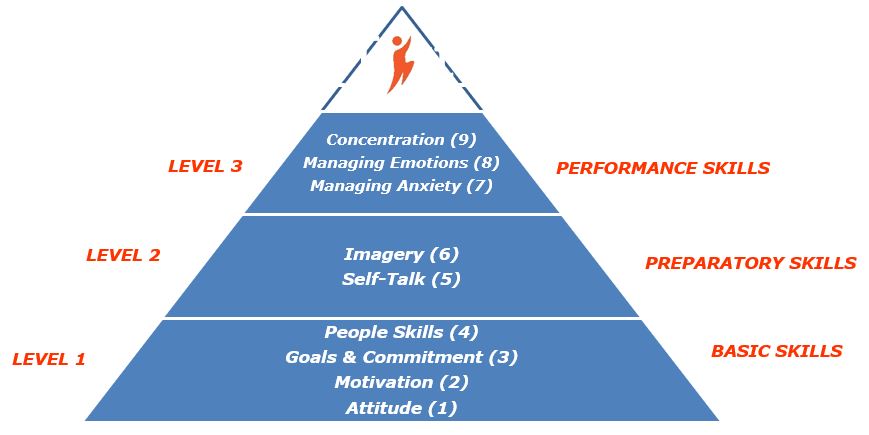
In his work to qualify the effective use of each of the respective nine mental skills, Dr. Lesyk found that a score of 85% (out of 100%) for any one of the skills demonstrates effective use of that skill.
In combing the assessment results of the 30 pros and creating a group profile, we can begin to define the mental strengths and areas of need for our emerging pro players.
Assessment Results
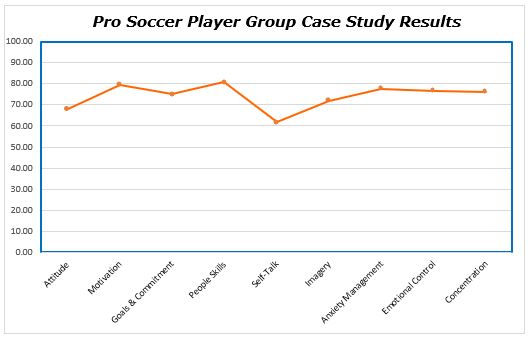
In general, the biggest point to consider is that none of the nine mental skills scores above 85% for the group as a whole! Remember, there are National Team players, MLS Cup Champions, and All-Americans in this group study. Many conjectures come to mind as to why these accomplished players fail to score above 85% in any one category as a group. The first, and most significant, might be that very little mental skills training is available to these young pros. Further, below you can see the exact scores for each of the nine mental skills.
Mental Skills Scores for Each of the 9 Mental Skills
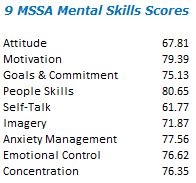
When we order the scores from highest scoring to lowest scoring we can really begin to define where these players would ideally begin a mental training program. Generally, as a Certified Mental Performance Consultant, I would suggest beginning work on the lowest three scores in the pre-season.
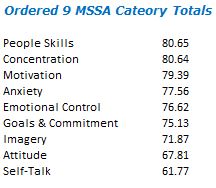
Whole Player Pool Mental Skills Profile Thoughts
- In aggregate, the whole group didn’t score above 85% for any of the nine mental skills.
- Three mental skills scored significantly lower than all others: Self-Talk, Attitude, and Imagery.
- With Self-Talk and Imagery scoring so low, it appears that the Preparatory Skills section is the most under-developed of the three sections.
- People Skills, Motivation, and Concentration are the bunched tightly together as the highest scores and lend credence to this group of players being quality individuals who are motivated to do their jobs well and are close to being able to focus at an elite level.
Consider the value in these young pros making improvements in their mental skills. Imagine how effective they might be on the field in early season tight games if they learned how to better employ their Imagery, Attitude and Self-Talk scores. Stay tuned for the next post as we look at the positional breakdown of the nine mental skills assessment results.
If you would like to read the article as a whole, please find it in The Soccer Journal:
Soccer Journal Article Link:
http://soccerjournal.nscaa.com?shareKey=VQFizo
- Getting Your Intensity Level Right - March 17, 2025
- Building a Functional Resilience Plan is Vital to a Referee’s Success - February 18, 2025
- sport in a pandemic: Crisis or opportunity?Chapter 4 - December 4, 2020


